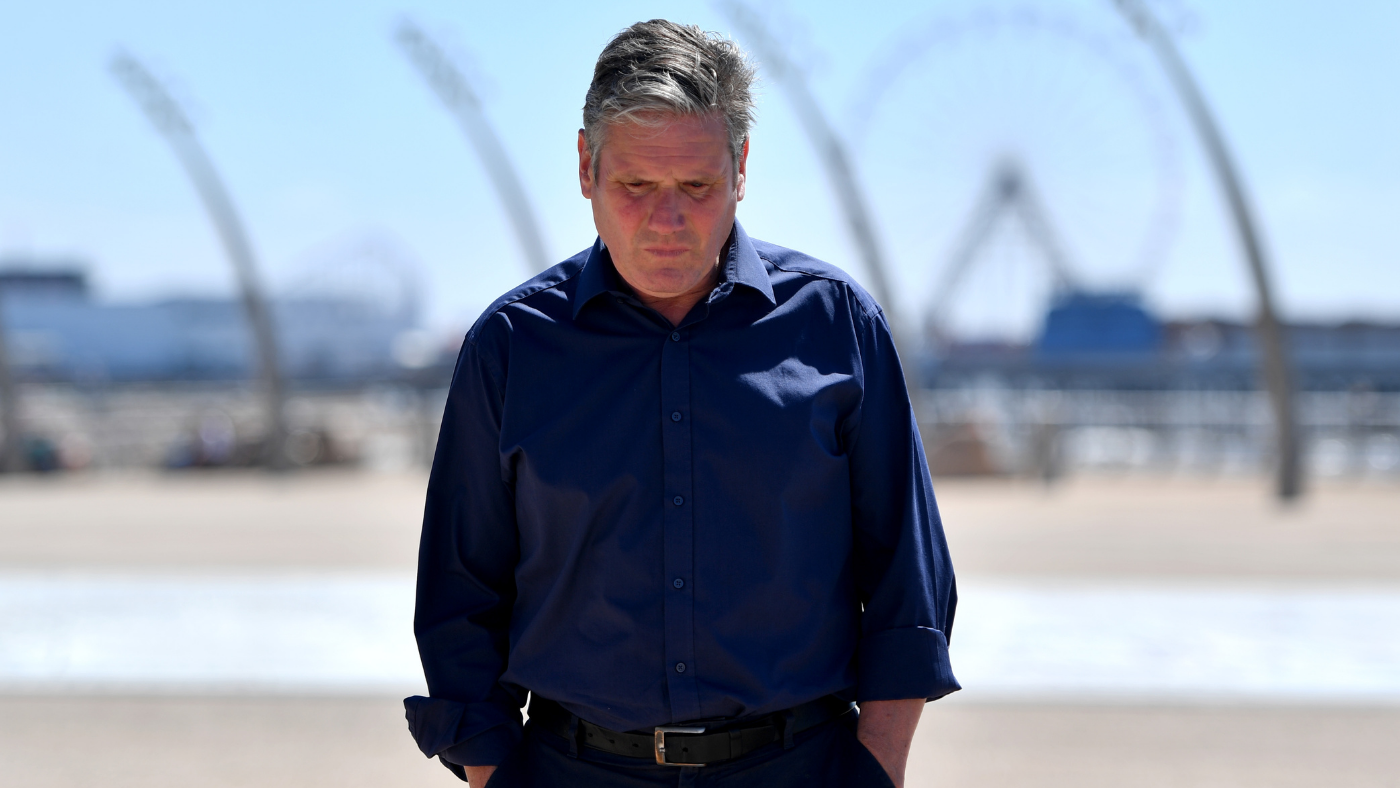‘Labour’s track record on dealing with racism falls wildly short’
Your digest of analysis and commentary from the British and international press

- 1. Labour’s silence on Apsana Begum shows how morally bankrupt the party has become
- 2. End-of-life care should not simply be about prolonging a painful death
- 3. Trudeau could learn from Ford’s vaccination plan
- 4. We want a cushy life but we can’t afford it
- 5. Geronimo the alpaca: animal-obsessed Brits have a history of forcing politicians to intervene
A free daily email with the biggest news stories of the day – and the best features from TheWeek.com
You are now subscribed
Your newsletter sign-up was successful
1. Labour’s silence on Apsana Begum shows how morally bankrupt the party has become
Joshua Kelly and Sam Green for Novara Media
on a lack of solidarity
Labour MP Apsana Begum described incidents of domestic abuse and honour-based harassment as she fought a legal battle against an accusation of housing fraud, and has faced a “barrage of death threats and online torment” even after being found not guilty, write Joshua Kelly and Sam Green on independent, left-wing site Novara Media. Yet throughout her 18-month trial and since, the Labour Party “has consistently failed to show solidarity” with her. Perhaps “this should come as no surprise, especially given that Begum is a woman, a Muslim and a socialist”, suggest Kelly and Green. “Labour’s track record on dealing with racism both inside and outside the party… falls wildly short.” Begum’s case brings into focus Labour’s “misguided priorities” in focusing on issues such as “the perceived far-left threats within its ranks”. Keir Starmer should not be surprised that “many wonder if the party is even capable of reforming itself under his leadership”, the pair conclude.
The Week
Escape your echo chamber. Get the facts behind the news, plus analysis from multiple perspectives.

Sign up for The Week's Free Newsletters
From our morning news briefing to a weekly Good News Newsletter, get the best of The Week delivered directly to your inbox.
From our morning news briefing to a weekly Good News Newsletter, get the best of The Week delivered directly to your inbox.
2. End-of-life care should not simply be about prolonging a painful death
Polly Toynbee for The Guardian
on funding decisions
The National Institute for Health and Care Excellence (NICE) can be relied on to provide “the most authoritative standard view” when it comes to medical advice, said Polly Toynbee in The Guardian. The health body has proposed a “controversial” cut in additional spending on drugs “that may only delay death a little”. That proposal may be better received now than previously, given “public opinion has shifted considerably” on the issue. Funding could then be “reapportioned” to other services. “For decades, public opinion has backed the right to assisted dying.” Now it’s for NICE to advise the NHS on why “easing the exit from life with the best possible palliative care is the way to spend funds, not on wastefully expensive drugs to prolong the inevitable”.
A free daily email with the biggest news stories of the day – and the best features from TheWeek.com
3. Trudeau could learn from Ford’s vaccination plan
Randall Denley in the National Post
on different approaches
Canada’s prime minister, Justin Trudeau, “could learn a thing or two” from Ontario premier Doug Ford, who has figured out that “pushing vaccine numbers higher is a tricky, multi-dimensional problem that requires more than political slogans”, Randall Denley wrote in the National Post. The liberal Trudeau’s plan has “hit a couple of reality bumps”, while Ford has gone for “a more targeted and balanced approach”. Ontario has focused on targeting workers “in high-risk settings”, including those working with the vulnerable and elderly. “That makes sense,” said Denley. Less so does Trudeau’s plan, which would predominantly affect public servants who are working from home.
4. We want a cushy life but we can’t afford it
Emma Duncan for The Times
on why we can’t have our cake and eat it too
“Now that people have been sprung from their domestic prisons, consumer spending has leapt,” said Emma Duncan in The Times – but “there’s a problem with the supply of workers”. The furlough scheme, and an “unwillingness, as a society, to do some of the jobs on offer at the price that employers are offering”, are partly responsible. But what some might call “laziness” Duncan thinks is “a perfectly sensible choice”. The fact is, this is what happens when a country’s wealth increases, she explains: “People choose pleasant jobs over tough ones and leisure rather than money.” This is “a problem of national cakeism”, Duncan added. “At some point, we’re going to have to make up our minds what sort of a country we want to be.”
5. Geronimo the alpaca: animal-obsessed Brits have a history of forcing politicians to intervene
Imogen West-Knights for i news
on unusual political pressure
It’s a sad end to a story that has kept the nation on tenterhooks. Geronimo the alpaca has been sentenced to death – “but there will be another like him”, said Imogen West-Knights on the i news site. The writer looks forward to that day when “an elected member of parliament has to stand up, smooth down her suit and offer her condolences on the untimely passing of a ferret or what have you”. Britain, West-Knights said, “is a nation notoriously obsessed with animals”. Why else would the prime minister’s father “plead” with his son “to spare this benighted beast?” she asks. “This is the kind of thing that people in this country demand of our politicians,” West-Knights continued. And while these stories may be “palpably ridiculous”, wouldn’t we miss them if they stopped.
-
 Quiz of The Week: 14 – 20 February
Quiz of The Week: 14 – 20 FebruaryQuiz Have you been paying attention to The Week’s news?
-
 The Week Unwrapped: Do the Freemasons have too much sway in the police force?
The Week Unwrapped: Do the Freemasons have too much sway in the police force?Podcast Plus, what does the growing popularity of prediction markets mean for the future? And why are UK film and TV workers struggling?
-
 Properties of the week: pretty thatched cottages
Properties of the week: pretty thatched cottagesThe Week Recommends Featuring homes in West Sussex, Dorset and Suffolk
-
 'Angel' visits woman before lottery win
'Angel' visits woman before lottery winTall Tales And other stories from the stranger side of life
-
 Doomsday group offers 'epic' survival opportunity
Doomsday group offers 'epic' survival opportunityTall Tales And other stories from the stranger side of life
-
 Captain Tom charity closes to donations amid daughter’s pool row
Captain Tom charity closes to donations amid daughter’s pool rowSpeed Read Hannah Ingram-Moore to appeal council order to demolish spa complex at her home
-
 What we know about the Titan sub’s likely implosion
What we know about the Titan sub’s likely implosionfeature Experts say the five passengers would have died ‘instantaneously’ following ‘catastrophic’ loss of pressure
-
 What happened to the missing Titanic sub?
What happened to the missing Titanic sub?Today's Big Question Oxygen supplies running out after vessel lost contact during ‘daredevil’ trip
-
 Man arrested after shooting himself in the leg
Man arrested after shooting himself in the legfeature And other stories from the stranger side of life
-
 Scientists have watched the end of the world
Scientists have watched the end of the worldfeature And other stories from the stranger side of life
-
 Canada’s troubled relationship with its indigenous population
Canada’s troubled relationship with its indigenous populationfeature State grappling with reparations amid accusations of genocides against First Nations people